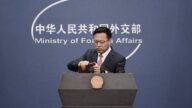【新唐人2013年09月07日訊】敘利亞內戰戰事踏入第三年,早前的化學武器襲擊,更令敘利亞局勢急速惡化。最近,美國政府宣佈掌握了敘利亞總統阿薩德對國民使用沙林毒氣的新證據,並向阿薩德發出軍事打擊威脅。美國《華爾街日報》刊文認為,這讓北京當局陷入了新的困境。
敘利亞當局被指曾經數次對平民使用化學武器,8月21號發生在首都郊外的那起大規模攻擊是最新一次。美國說,那起攻擊導致1429人死亡,其他國家和組織公布的死亡人數低於美方的統計。
英國首相卡梅伦9月5號接受英國《BBC》採訪時表示,英國也獲得敘利亞使用化學武器新證據。
對於最新的中東危機,中共還是以慣常的姿態作出反應。9月2號,中共外交部發言人洪磊說,中方注意到關於美方公布證據的報導,但他沒有對此做出任何評價。中共喉舌《環球時報》指責美國突然要發動攻擊,「輕率得像敲核桃」。《新華社》則說,美國總統歐巴馬迷戀武力將令美國誤入歧途。
美國《華爾街日報》9月3號的文章說,幾十年來,中共宣稱的外交政策的基本原則是不干預其他主權國家的內政。文章諷刺道,這一原則在中東導致了一系列外交衝擊。
時事評論員司馬泰認為,中共經常用所謂的不干涉別人內政作為擋箭牌,所以它的反應不足為奇。
司馬泰:「它干涉別國內政,簡直沒有任何顧忌。它用大量的錢去給一些小國家、獨裁國家,包括一些非洲國家,用錢去收買它們,讓它們在聯合國幫它說話。在西方國家,它進行滲透,對媒體滲透,收買他們的人。」
從利比亞狂人卡扎菲到埃及的穆巴拉克,他們的獨裁暴行早已注定他們要垮臺。《華爾街日報》的文章分析,中共領導人之所以依然對這些暴君表示支持,因為他們認為,如果西方國家可以為中東那些非民主政府「送行」,那麼或許有一天就會試圖推翻中共政權。
中國問題專家藍述:「 整個共產主義的歷史就是反人道的歷史,所以中共擔任了常任理事國以後,它明明看見了對人道的踐踏它也不去管,這個才是問題的本質。因為它是共產主義的獨裁國家。」
中國問題專家藍述分析,中共支持敘利亞政府的原因,主要有兩點,一是希望在和美國或其他西方國家打交道時,中東地區如果有一個盟友,中共手上便能多一點籌碼;另外,中共也希望藉此來討好俄國。
藍述:「因為俄國在敘利亞有大量的利益,石油、軍售等等。討好了俄國後,它將來和俄國走的近一點,將來在亞太地區和周邊國家發生衝突時,它有可能從俄國那得到支持。」
時事評論員林子旭表示,這幾年看到周圍的狐朋狗友一個個落馬、死掉,中共就已經膽戰心驚。
時事評論員林子旭:「阿薩德政權如果再垮臺了,中共或許就只能抱著朝鲜哭泣了。敘利亞如果出現政權更替,國內的輿論必然又是一番討論,這都是中共最不希望看到的」
目前中共在中東沒有軍事基地,也沒有地面部隊。與此同時,中共在中東的利益也與日俱增。除了對伊拉克油田和沙特阿拉伯及海灣地區的大型建築項目進行了大力投資,中國國企也派出成千上萬名工程師、地質學家和工人,為那些項目提供支持。
《華爾街日報》文章觀察指出,在這一地區選擇錯誤的一邊,讓中共付出了高昂代價。它不僅令北京與中東地區民粹主義政府之間的關係複雜化,同時也使得中國能源和工程公司的前景受到威脅。
採訪/易如 編輯/王子琦 後製/孫寧
Syrian Situation Brings Dilemma for Beijing
While the Syrian civil war enters its third year, the situation
has rapidly deteriorated due to prior chemical weapon attacks.
Recently, the U.S. government announced that new evidence
showed Syrian President Assad using sarin gas to kill civilians.
The Wall Street Journal published an article saying
that this has brought a new dilemma for Beijing.
Syrian authorities have been accused several times of using
chemical weapons against civilians.
On August 21, a large scale attack occurred at the outskirts
of the Syrian capital.
The U.S. said the death toll of this attack was 1,429,
but other countries and organizations showed a lower figure.
On September 5, British Prime Minister David Cameron
said, during an interview on British BBC, that the British
have new evidence of chemical weapons
having been used in Syria.
For the latest Middle East crisis, the Chinese Communist
Party (CCP) responded with its usual attitude.
On September 2, Hong Lei, spokesman of China’s Foreign
Ministry, said China noticed the U.S. evidence report,
but would not make assessment on it.
The CCP’s mouthpiece Global Times accused the U.S.
of attempting to launch a military attack as recklessly
as cracking walnuts.
Xinhua News Agency said that President Barack Obama
is obsessed with using military power, which may lead
the U.S. astray.
The Wall Street Journal article said for decades, the CCP
adopted a principle of non-intervention towards internal
affairs of other states.
However, the article quipped, that principle is leading
to a series of diplomatic impact in the Middle East.
Sima Tai, political commentator, believes that the CCP
often uses non-interference of internal affairs of others
as a shield, so its reaction is expected.
Sima Tai: “China interferes with internal affairs of others,
almost without scruple.
It gave a lot of money to some small countries
and authoritarian regimes, including some African countries,
so these countries speak for China in the United Nations.
Meanwhile, China infiltrates the Western media,
buying their employees."
The report said that from Libya’s Gaddafi to Egypt’s
Mubarak, these autocratic regimes were doomed to collapse.
But, why did the CCP support these dictators?
Because the CCP thinks if the Western countries can see
these non-democratic countries in the Middle East off,
perhaps one day it will attempt to overthrow the CCP.
Lan Shu, China affairs expert: “History of communism
is history of anti-humanity.
Therefore, after becoming a permanent member of the UN’s
Security Council, China ignores humanitarian abuses.
That is the nature of the problem because it is a communist
dictatorship."
Lan Shu believes that the CCP supports the Syrian regime
for two reasons.
It is good to have an ally in the Middle East when dealing
with the U.S. or other Western countries.
It also hopes to please Russia.
Lan Shu: “Russia is interested in Syrian oil and selling
arms to Syria.
Pleasing Russia or getting close to Russia may gain support
from Russia in the future if there are conflicts
in the Asia Pacific region and the neighboring countries."
Political commentator Lin Zixu: “In recent years, the CCP
was scared to death, watching his buddies fall one by one.
If the Assad regime collapses, the CCP can only cry
with North Korea in its arms.
However, the CCP would hate to see another regime
replace the current one in Syria."
At the moment, the CCP has neither military bases nor
ground troops in the Middle East, but increased interests.
In addition to investing heavily in the oil fields in Iraq,
Saudi-Arabia, and major construction projects in the Gulf,
the CCP also sent tens of thousands of engineers, geologists
and workers to provide support for those projects.
The Wall Street Journal article pointed out that the CCP
has to pay dearly for choosing the wrong side in that area.
Not only does it complicate the relationship between Beijing
and the Middle East, but it also threatens the future of China’s
energy and engineering companies.





























